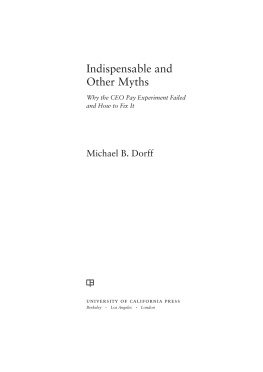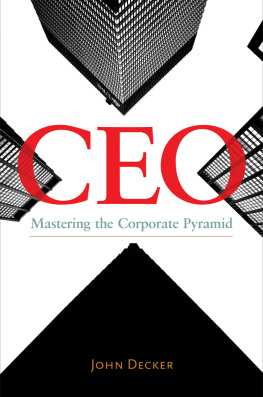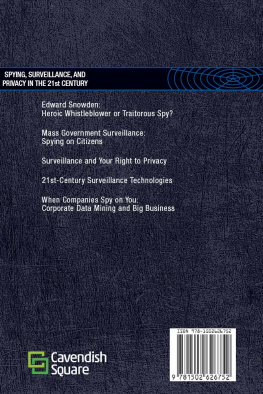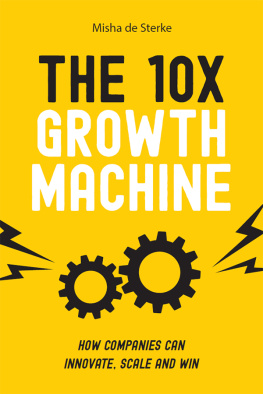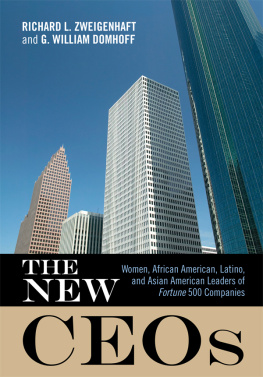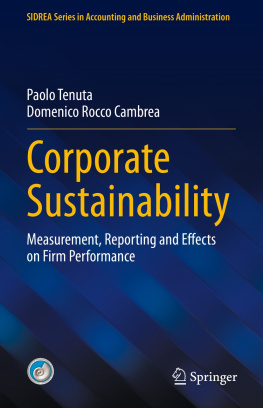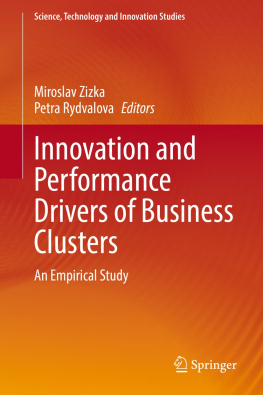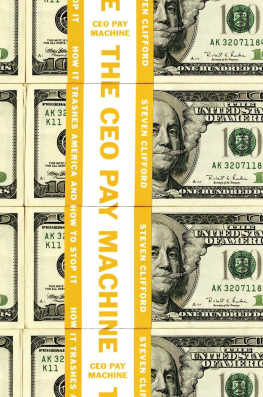Acknowledgments
I am deeply grateful to all the wonderful, supportive, and kindhearted people who made this book possible. This project began when my father, Elliot Dorff, told me I had written enough articles about CEO pay, and it was time for a book. Had I known how many years of work would be required to finish it, I probably would never have started. So its just as well that he greatly underestimated the time and effort that would be necessary. Sometimes parents are right for the wrong reasons. The author of countless scholarly books himself, my father patiently guided me through the process and assured me that I would reach the end... eventually. My mother, Marlynn Dorff, was also an unceasing source of support and encouragement.
I owe a special debt to Carl Albert, chairman of Boise, Inc. Carl was an early believer in this project and has given me invaluable feedback throughout. He has also been tireless in advancing the books ideas and finding new people for me to persuade and places for me to speak. He is an ideal mentor and role model.
I was fortunate to have many talented and accomplished scholars provide comments on the manuscript. My close friends Russell Korobkin and Douglas Lichtman were among the first to read it. Their suggestions greatly improved the final product and gave me the courage to show the manuscript to others. They were both especially helpful in coming up with the title, as was Michael Grunwald. Stephen Bainbridge, Charles Elson, Jesse Fried, Kevin Murphy, Elizabeth Pollman, Lynn Stout, and David Walker have all taught me a great deal about CEO pay and corporate governance. This book has profited hugely from their outstanding scholarship and insightful comments. Gary Bass, Noah Feldman, Kim Ferzan, Paul Horwitz, Dan Markel, Carrie Menkel-Meadow, Dennis Patterson, Nate Persily, and Adam Winkler patiently guided a neophyte through the labyrinthine publication process and led me through to the other side. I am very lucky to count them as friends. I am also thankful for Debbie Gershenowitzs guidance and publication advice.
Closer to home, Southwestern Law School provided financial support over several summers and a sabbatical that enabled me to complete the book. Even more important, my Southwestern familyRyan Abbott, Mark Cammack, Bryant Garth, Priya Gupta, Danielle Hart, Roman Hoyos, Hila Keren, Caleb Mason, Art McEvoy, David Fagundes, Gowri Ramachandran, Kelly Strader, John Tehranian, and Dov Waismancritiqued countless drafts and participated in endless office conversations about them. And my Drucker School of Management teaching partners, Jay Prag and Hideki Yamawaki, provided a much-needed management perspective. I feel privileged to have such wonderful and supportive colleagues.
Southwestern also supplied me with a number of hardworking and talented law students who provided exceptional research assistance: Natalie Lee, Meredith Lierz, Justin Nash, and Grant Savoy. Another student, Joshua Roberts, provided helpful feedback. Thomas Harvey also gathered material for the book before his untimely death; I wish he were here to celebrate its completion with us.
Peter Richardson at the University of California Press saw the books potential immediately and guided the manuscript through the approval process in record time. Along the way, he patiently introduced me to the world of academic publishing and made sure my missteps were few and quickly corrected. Christopher Lura ensured that all the technical aspects of production went smoothly. Sheila Berg, my copy editor, ensured that the text clearly and grammatically conveyed my meaning. I hope this is just the first of many projects we all work on together.
Cindy Kazan and Leslie Steinberg have helped me reach out to a much wider audience than I could possibly find on my own. If the book influences the public policy debate, it will in large part be due to their energy and enthusiasm.
Finally, and most important, I want to thank my children, Zoe and Miles, and my wife, Tanya, for their tolerance and loving understanding. I know they have heard far more than they want to about CEO pay, and Im sure they are greatly looking forward to other topics of conversation. We can now move on to (respectively) Percy Jackson, the Teenage Mutant Ninja Turtles, and the impact of fasting on oxidative stress markers in patients taking gemcitabine and cisplatin for advanced solid tumors.
CHAPTER 1
Introduction
The year 2008 was a tough one for most public corporations. The stock market collapsed, diving 38 percent. The broader economy sank into the deepest and longest recession since the Great Depression. The financial markets froze, blocking companies from their usual ability to borrow when in trouble.
Even against this depressing backdrop, some companies suffering stood out. American International Group (AIG) endured cataclysmic losses in 2008, over $13 billion in just the first six months. Annual losses grew to a staggering $99 billion by years end. From a high of over $70.00 per share, AIGs stock price fell to $1.25 per share in September, a drop of over 98 percent. To keep AIG afloat, the federal government ultimately loaned the company over $180 billion.
Few companies have imploded as dramatically as AIG. But other companies shares also dropped much further than the market as a whole. The stock price of Abercrombie and Fitch sank 71 percent, for example, and the oil and gas company Nabors Industries saw its share price cut in half.
When a company performs as dismally as these three did, we expect the board to fire the CEO. We might also envision (even a little gleefully) that the CEOs assets would be confiscated in lawsuits by angry shareholders. Images of brave captains going down with their ships spring to mind. After all, these CEOs led their companies into disaster, causing mayhem for employees, customers, suppliers, the economy generally, and, most important, the companies ownersthe shareholders. In a Darwinian economy, we expect the weak to be, well, eaten.

